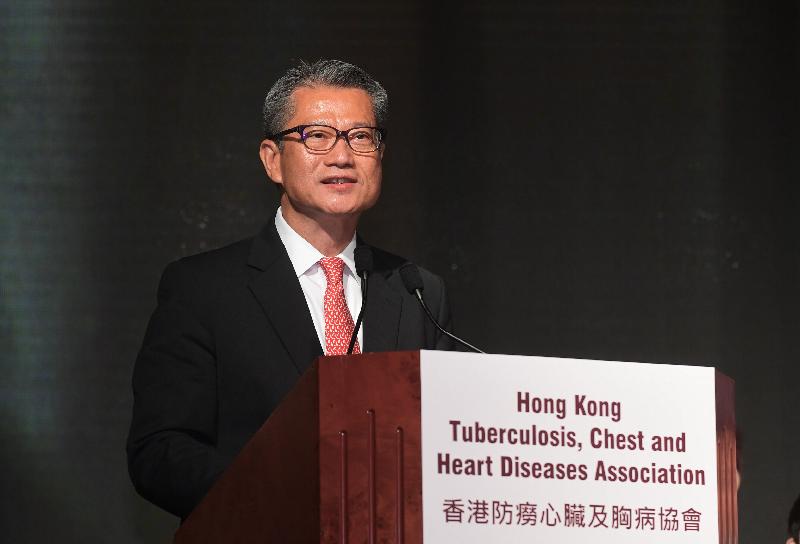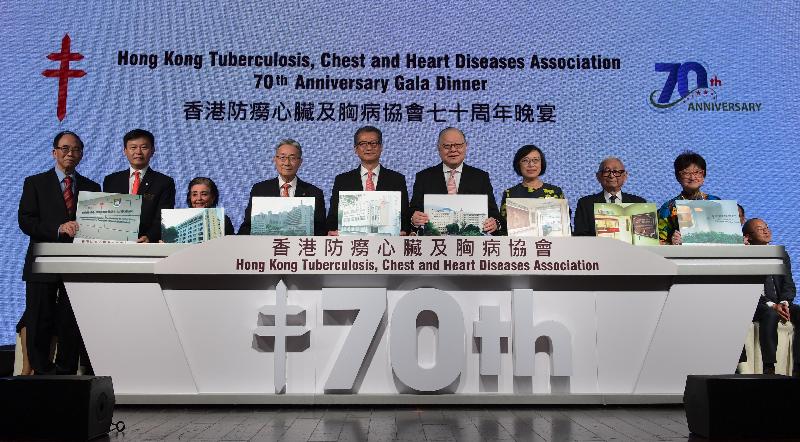Following is the speech by the Acting CE, Mr Paul Chan, at the Hong Kong Tuberculosis, Chest and Heart Diseases Association 70th Anniversary Gala Dinner this evening (October 22):
Sophia (Secretary for Food and Health and President of the Association, Professor Sophia Chan), Mr Steve Lan (Chairman of the Association, Mr Steve Lan), distinguished guests, ladies and gentlemen,
Good evening.
I am honoured to join you tonight for the 70th anniversary of the Hong Kong Tuberculosis, Chest and Heart Diseases Association.
I was delighted to hear your Chairman say that the Association's finances are in a "very healthy" condition. Delighted because it's not often I hear that from any non-profit services group I speak to. So you're clearly exceptional, and in more ways than one.
On this good occasion, we mark more than the Association's 70th anniversary. We are here, as well, to commemorate your critical role in the fight against tuberculosis (TB).
During World War II and in the years following the War, Hong Kong was plagued by TB which is not surprising, given the overcrowding living environment, the unstable social conditions, and poor nutrition. And then in 1948, the Association came alone with a mission to fight TB, as well as heart disease. A year later, you built Ruttonjee Sanatorium for patients suffering from TB.
Thankfully, the number of TB cases plummeted in the 1950s, thanks to the launch of the BCG vaccination for new-born babies, the establishment of a chest service in the Department of Health, increasingly effective treatment and improving socio-economic situation.
From a historic high of more than 697 reported cases per 100 000 people in 1952, the TB incidence rate fell to just over 58 cases per 100 000 people last year. That's thanks to dedicated efforts throughout the community. And, of course, to the Association's outstanding leadership, including its administration of Ruttonjee Hospital and Grantham Hospital, its support for World TB Day and research activities, and its strong links to the World Health Organization and the International Union Against Tuberculosis and Lung Disease.
Worldwide, TB is still a significant disease. Indeed, more than 10 million new cases of TB are reported each year. That includes over 4 000 new cases annually in Hong Kong.
That said, I am confident that the Association's vigilance and proactive measures will continue to minimise the disease in our community.
Indeed, as TB's threat to the people of Hong Kong waned over the years, the Association broadened its reach, and benevolence, into other medical areas of concern. They include elderly home and oral health services, traditional Chinese medicine and health promotion covering the risks associated with smoking and alcohol abuse, physical inactivity and poor diet – all of which are related to cardiovascular diseases, killers of nearly 18 million people every year around the world.
In less than two weeks ago, the Chief Executive emphasised in her Policy Address the importance of our healthcare services. I was also pleased to note that life expectancy here in Hong Kong, for men and for women, tops the world. Our health care services are among the world's most efficient according to the Bloomberg Health-Care Efficiency Index, a global study published just last month which ranked Hong Kong first among 56 economies.
That, of course, does not mean any slackening of our commitment to quality healthcare, and certainly no cutting back on the significant resources, expertise and planning we bring to healthcare to the people of Hong Kong.
This is why Chinese medicine services would be incorporated into our healthcare system. As announced in my Budget this year that a dedicated fund, of HK$500 million, has been created to promote the development of Chinese medicine in Hong Kong. The fund, ladies and gentlemen, will begin operation in the first half of next year. I should also mention another initiation in my Budget underscoring the commitment of the administration on quality healthcare – that is the HK$300 billion earmarked as an initial provision to support the second 10-year hospital development plan, improve Department of Health's clinic facilities, and upgrade and increase healthcare teaching facilities.
Your Association, I'm pleased to say, has been active in Chinese medicine for a dozen years now. As your Chairman noted, the Association runs two of the Hospital Authority's 18 Chinese Medical Clinics. Beyond general medical services, the clinics offer teaching and research services for Chinese medicine practitioners.
Your Association also promotes Chinese medicine to the general public and is engaged in community-based studies related to Chinese medicine.
In short, whether it's TB or heart disease, working with the elderly or promoting Chinese medicine, the Association jumps right in, bringing to the challenge a much welcomed mix of commitment, expertise and decades of experience working on behalf of the people of Hong Kong.
I have no doubt that you will continue to collaborate with the Government in these and, no doubt, other areas down the road.
When we mark your centennial anniversary in 30 years' time, rest assured I'll be here for that happy occasion – I hope we can also celebrate the eradication of TB – in Hong Kong and around the world.
Ladies and Gentlemen, please enjoy this very special evening.
Thank you.
Follow this news feed: East Asia







